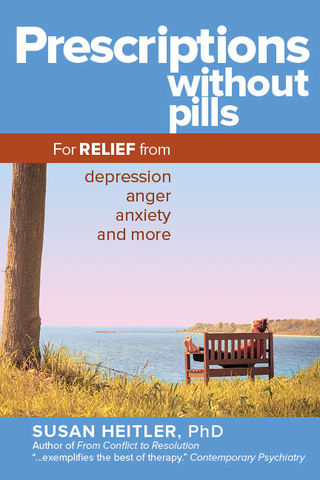Anger
Anger is a Stop Sign
What do you do at a stop sign? Stop, look and listen. Stop signs keep us safe.
Posted August 18, 2012

When you are not getting something you want, or getting something that you don’t want, anger may surge. Beware, as excessive anger is one of the leading causes of divorce and can cause significant damage also to children, friendships and work relationships. How effective is your anger control? To keep your anger from becoming problematic, regard anger as a stop sign.
What is anger?
Anger wells up in response to chemicals from the more primitive middle and lower parts of your brain, chemicals designed to mobilize animals for aggressive action. "GO!” is the message these chemicals give, spurring an animal forward to forcibly get what it wants—to dominate over a potential rival, to be the first at food, to scare away or fight an animal that could cause harm.
Anger in people serves pretty much the same purposes. Anger mobilizes you for action to get what you want: that is, to make others do what you want them to do, or stop doing something you dislike.
Alas, however, when people lack anger management skills and instead explode angrily, their anger eruptions are likely to engender serious costs. Anger outburts may win the battle, giving you the immediate object of your desire. At the same time, unlike bulls or lions, people tend to want to affiliate as well as to dominate. People want to be liked, and even loved. While anger outbursts may win the immediate battle to get you what you want, they weaken your connections with and attractiveness to colleagues, friends, and family.
Angry feelings alert you to a problematic situation.
Once anger has conveyed its Pay Attention message however, the angrier you feel, the less effectively you will be able to solve the problem That's because anger decreases ability to think, take in new information, take a fresh perspective, or come up with a new solution. Anger closes off ears to data uptake. Like your computer, overheating causes the brain’s information-processing mechanisms to freeze, to shut down. Zippo thinking.
Once anger has alerted you to a problem therefore, you’ll be best off heeding the stop sign. The following video illustrates one couple that runs through stop signs, and another that heeds their stop signs to protect their relationship.
THE KEY TO ANGER CONTROL IS TO REMEMBER THAT ANGER IS A STOP SIGN
What do you do at a stop sign? Even young children know the answer to that question. You do not pick up the stop sign and clobber oncoming cars and trains with it. No. You stop, look and listen.
STOP
Stop moving forward in the current interaction.
Pause for a moment so you can remind yourself to use whatever you have in your bag of tricks for lowering your emotional intensity. Breathe deeply for several cleansing breaths, distract yourself by thinking about something else, consciously relax muscles that may have tensed up, count to ten...
Changing the topic for a bit can help you both to stop an increasingly heated interaction. Pleasantly make a left turn onto another conversational pathway: “Oh, by the way, I meant to tell you that Aunt Jennie will be in town….”
If these pauses in the conversation do not suffice to calm your rising anger tide, remove yourself from the situation. “Excuse me. I need a drink of water,” you might say as you stand up and walk into another room.
Self-soothe there, using your techniques like distraction by reading whatever is handy, by slowing down your breathing. Then, once you have returned to a calmer emotional state, you can begin to plan how you will handle the situation more effectively when you return from your self-imposed time-out.
LOOK
Look at the situation from a fresh perspective to figure out what you really want.
Devise a more savvy way than bludgeoning your dialogue partner with anger to get what you want. Remember, you have a big advantage over bulls or lions. You can use words to analyze your situation, understand your concerns, and create a plan for what you might do differently.
Beware! There’s a potential trap when you are looking at the provocative situation. I call it the “locus of focus” trap. Your focus must be on yourself, not on the person at whom you feel angry. Stay clear of thoughts about what you want the other person to do differently. Focusing on what the other person did that you didn't like or even on how to get the other person to do what you want will only reignite your frustration and anger.
Your focus needs instead to be on yourself. Think about your part in what went wrong, and on what you yourself could do to handle the situation more effectively. Empowering yourself instead of controlling others is a key component of overcoming the temptation to handle sensitive situaitons via anger.
Again and again remind yourself, starting when you feel even the first little flickers of irritation, “My job is to look for what I myself can do differently to get what I want, not to tell others what they should do.”
LISTEN
Here’s the hardest part. Ask about the other person’s concerns. Then be sure to isten for what makes sense to you about their answers. Listen to truly understand their perspective instead of giving in to temptations to respond defensively or to tell them what’s wrong with their viewpoint.
In fact, the angrier you feel, the more difficult it will be to genuinely listen to the person you are mad at. That's because when you are angry, you will feel as if what you want is sacred, and what the other person wants is irrelevant. Your wants will loom huge; others' will shrink to virtual nothingness.
You’ll have to be sure therefore that you have thoroughly calmed yourself during your initial Stop. That's essential so that when you get to Listen, you will be able to meet the difficult challenge of lsitening to understand the other's concerns.
Fortunately, if you truly do listen well enough to understand sympathetically the other person’s perspective, you will have higher odds of getting what you want! Sound paradoxical? It is, and it is very real. Ask any skillful salesperson. The more a salesperson understands his customer's concerns, the more likely that they will reach an agreement.
So for reliable anger control when you see red, remind yourself: ANGER IS A STOP SIGN. What do you do at a stop sign? Stop, look, and listen.
------------------------------------

Denver clinical psychologist Susan Heitler, Ph.D, a graduate of Harvard and NYU, is author of Power of Two, a book, a workbook, and a website that teach the communication skills that sustain positive relationships.
Click here for a free Power of Two relationship assessment.
Dr. Heitler's latest book, Prescriptions Without Pills, offers strategies for dealing effectively with negative emotions, anger included.
See the free prescriptionswithoutpills.com website for free anger-reduction worksheets and videos.




